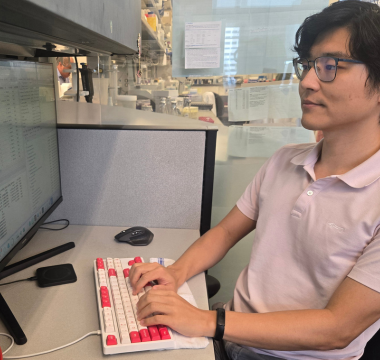My PD Story

Jeff Kim, PhD
2025 Postdoctoral Fellowship
Leveraging AI to Decode the Genetics Behind Parkinson’s
Parkinson’s Foundation research has found that approximately 13% of people with Parkinson’s have a genetic link to the disease. PD-associated DNA mutations affect the production and function of critical proteins, potentially contributing to disease risk or symptom progression. While many high-profile PD-associated mutations have been discovered in genes such as LRRK2, GBA, and SNCA, Jeff Kim, PhD, recipient of a Parkinson’s Foundation Postdoctoral Fellowship, is taking the field further by using artificial intelligence (AI) to:
-
Understand how overlapping types of PD mutations can affect the chances of developing PD.
-
Dig deeper into the genetic data to find more subtle, hidden mutations that might impact the risk for developing PD.
At first, genetic studies of PD were focused on finding rare single mutations most associated with disease. As techniques improved, researchers have been able to roughly measure the risk of developing PD by adding up the risk from multiple common mutations. However, “while we know that both rare gene mutations and combinations of common genetic variations can cause PD, we rarely study how these two types of genetic risk work together or change with age,” said Dr. Kim.

With his colleagues in the lab of Dr. Joshua Shulman at the Baylor College of Medicine a Parkinson’s Foundation Center of Excellence, in Houston, Texas, Dr. Kim is utilizing a new statistical tool called the “Causal Pivot Model” to better understand the complexities of PD mutation combinations. This model works on a simple principle: people with PD with rare single mutations usually don't have many common mutations. By looking at this pattern, the model can spot people who likely carry hidden rare single mutations that haven't been found yet. Dr. Kim is also building age into the model, since some mutations cause PD early in life while others strike later - this could help identify people at risk for early-onset disease.
Once the model has been tested and trained on enough data, Dr. Kim’s next goal is to combine the Causal Pivot Model with an advanced AI model called AI-MARRVEL to identify hidden potential PD mutations, ones that have been overlooked in previous analyses but can be spotted by this powerful tool. These mutations can then be tested in fruit flies, observing if they cause Parkinson’s-like symptoms and leading to novel therapeutics in the future.
Thinking beyond the data and computations, Dr. Kim is clear-eyed about the potential impact his AI-powered modeling could have for people with PD.
“Ultimately, this project aims to move us closer to clinically useful genetic information that could eventually guide personalized treatment strategies for people with Parkinson's disease,” said Dr. Kim.
Meet more Parkinson’s researchers! Explore our My PD Stories featuring PD researchers.
Related Materials
More Stories
from the Parkinson's community


